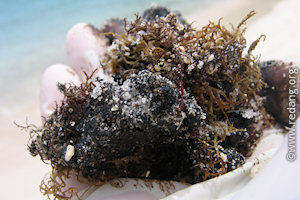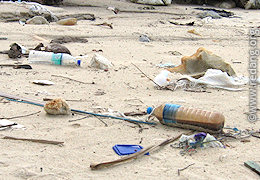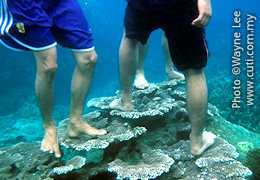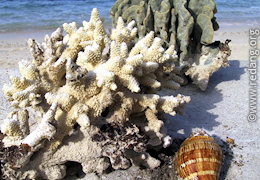The beaches and coral reefs at Redang are the primary attractions for the thousands of visitors each year. While park regulations exist to protect the marine environment in the Redang Marine Park, they are not always effectively enforced by the authorities. In order to protect the marine life and preserve them for future visitors to enjoy, every resort and every visitor needs to take personal ownership and responsibility to care for the coral reefs and marine environment, especially when each year sees increasing numbers of visitors to the island.
To put this into perspective, the total number of visitors to the Terengganu Marine Parks quadrupled from just 52,634 visitors in 2000 to 216,404 visitors in 2010 (source: Dept. of Marine Parks, Malaysia). If we assume that 5% of visitors (or 1 in 20) behave irresponsibly, that means over 10,000 people threatening or damaging the marine environment through their careless acts each year. Folks, if you want your children or grandchildren to enjoy Redang, then act responsibly and spread the word, else there'll be nothing left to see in a few years time!

Oil from ships can threaten the marine environment, like this oil-covered seaweed.
You can also help by choosing an eco-friendly resort to stay in where possible. If you are not sure, ask the resort staff and management to explain or demonstrate how they are helping to protect the marine environment. Simple things like how they dispose of sewage, dirty water and kitchen trash, how and where they wash the towels and bedsheets, how they store and dispose of oil or diesel for their power generators and general observations about how the resort staff operate, whether their staff are knowledgeable and well-trained in environmentally-friendly procedures and actions. As a paying guest, you have the right to know - it's only a question of whether you care enough to ask. The resorts that excel in this area will only be too happy to show you since they would have invested money, time and thoughtful planning in the resort construction and daily operating procedures. After all, being eco-friendly is good advertisement and makes good business sense. It is usually the resorts that are not eco-friendly that will be uncooperative or try to hide these from you.
Here are 3 simple rules you should always remember and follow whenever you are in Redang or any other protected marine park.
 Keep beaches clean
Keep beaches clean

- Throw rubbish into rubbish bins, not on the beach or into the sea. Help to clear any litter you come across.
- Beach and marine litter can harm animals that consume them mistakenly. A Queensland university study found that marine rubbish was the leading cause of death among sea turtles in 2007.
- Polluted waters reduce the amount of sunlight needed by corals to survive. Many detergents contain substances harmful to coral reefs and should not be used outdoors where they can seep into the soil and discharge into the sea.
 Avoid contact with corals
Avoid contact with corals

- Do not kick, kneel, stand or step on corals as this may break them.
- Snorkellers should not go near corals in shallow water to prevent accidental contact. Adjust your mask or snorkel while floating and swim away from corals before doing so.
- Divers should secure gauges and not drag them over the reef. Do not use knives or sharp objects to anchor on coral when fighting currents or taking photographs. When near corals, point fins upwards and fin gently using the frog-kick style.
 Don't collect marine life
Don't collect marine life

- Do not collect any marine life, whether dead or alive, such as seashells, corals, crustaceans and fishes, as souvenirs or collectibles.
- All marine life, whether dead or alive, play a part in sustaining the health of the coral reef ecosystem. Everything is recycled, nothing is wasted. Dead coral, coral rubble and empty seashells can provide protection and homes for many sea creatures.
- Don't catch fish or other marine life even if you intend to release them later. You may stress, injure or kill them in the process.
Signboards with the marine park regulations are displayed at various public locations around the island. These show the prohibitions in sections 44 and 45 of the Fisheries Act 1985 which is shown below. Section 25 of this Act states that offenders shall be liable to a fine not exceeding MYR20,000 or a term of imprisonment not exceeding 2 years or both. Seriously folks, please observe the regulations else the bars you'll be seeing won't be those on a Sergeant Major damselfish!
Malaysian fisheries act 1985 (sections 43 & 44)
- Any person who in any marine park or marine reserve in Malaysian fisheries waters without the permission of the Director-General in writing commits the following shall be guilty of an offence:
- Fishes or attempts to fish;
- Takes, removes or is in possession of any aquatic animal or aquatic plant or part thereof, whether dead or alive;
- Collects or is in possession of any coral, dredges or extracts any sand or gravel, discharges or deposits any pollutant, alters or destroys the natural breeding grounds or habitat of aquatic life, or destroys any aquatic life;
- Constructs or erects any building or other structure on or over any land or waters within a marine park or marine reserve;
- Anchors any vessel by dropping any kind of weight on, or by attaching any kind of rope or chain to, any coral, rock or other submerged object; or destroys, defaces or removes any object, whether animate or inanimate, in a marine park or marine reserve
- No person shall carry, use or possess within a marine park or marine reserve in Malaysian fisheries waters -
- Any spring-gun, spear gun, spear fishing equipment, harpoon or suction gun; or
- Any other kind of weapon potentially harmful to any aquatic plant life, aquatic animal life or to the coral reef structure.
Malaysian Marine Parks
- For more information about Malaysian Marine Parks, contact:
- Department of Marine Park Malaysia (Headquarters)
Ministry of Natural Resources and Environment,
Level 11, Wisma Sumber Asli, 25 Persiaran Perdana, 62574 Putrajaya
T: 03-88861111 | F: 03-88880489 - Jabatan Taman Laut Negeri Terengganu
Kementerian Sumber Asli dan Alam Sekitar,
16, Blok B, Bestari Centre Jalan Hiliran, Pulau Kambing, 20300 Kuala Terengganu
T: 09-6312062 | F: 09-6227266